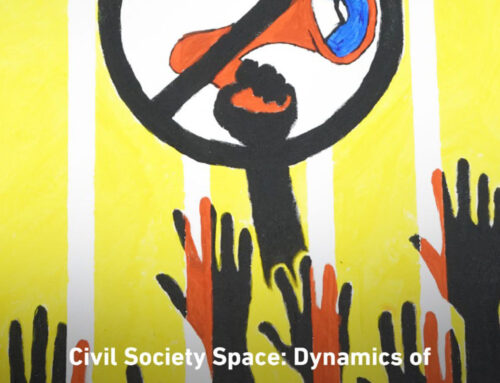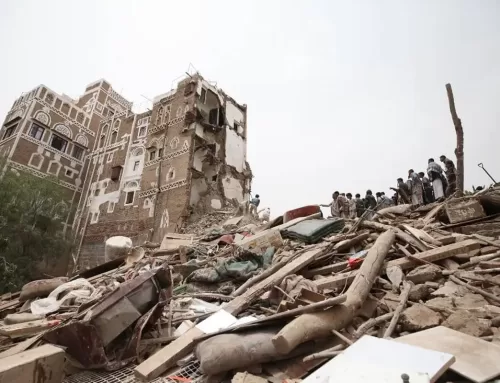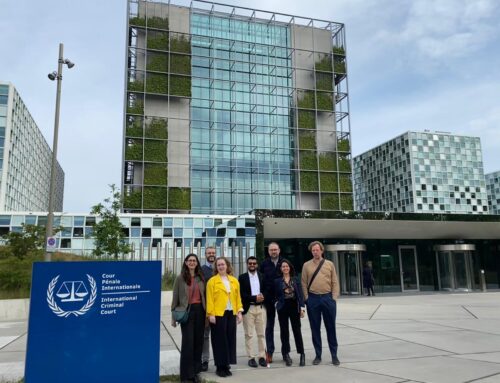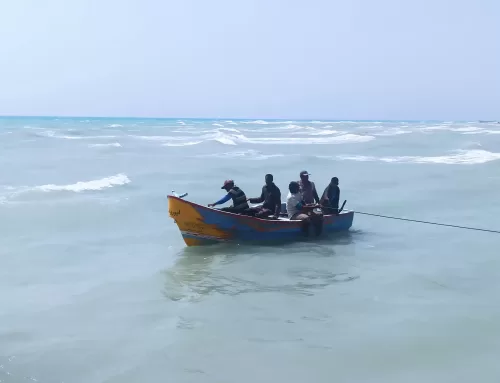Seven years since the conflict escalated and the coalition began its military operations in Yemen
March 26, 2022/-Sana’a
Mwatana for Human Rights emphasized that the parties to the conflict in Yemen must stop committing grave violations and attacks against civilians and civilian objects. Mwatana said in a statement released today, marking the seventh anniversary of the start of the Saudi/UAE-led Coalition’s military operations in Yemen, that the country witnesses the perpetuation of the policy of impunity in every new year of the conflict.
Since March 26, 2015, Saudi Arabia and the UAE have been leading a military coalition against Ansar Allah armed group “Houthis,” which, along with military units loyal to former President Ali Abdullah Saleh, seized the Yemeni capital, Sanaa, on September 21, 2014 by force. After seven years of war in Yemen, Mwatana for Human Rights continues to document violations and attacks by parties to the conflict in Yemen, including the Saudi/UAE-led coalition forces, the UAE-backed armed forces and groups, the Iran-backed Ansar Allah armed group “Houthis” and the internationally recognized Yemeni government forces.
In October 2021, the Human Rights Council (HRC) voted to end the mandate of the Group of Eminent Experts on Yemen (GEE) at its 48th session, making the human rights struggle for accountability and redress more challenging in an international environment full of obstacles to justice. Mwatana calls on the United Nations General Assembly and the Human Rights Council to establish an independent and impartial body to investigate the most serious violations and abuses stipulated in international law, committed in Yemen, and to submit public reports on them, as well as to collect and preserve evidence and prepare files for possible future criminal prosecution.
The lives of millions of Yemenis across Yemen have become a raging hell due to the waring parties’ continued inhumane practices and grave violations against them. The parties to the conflict in Yemen have not fulfilled any of their obligations under international law to provide reparations for the violations committed during the past period. The ongoing attacks by the parties to the conflict have had a devastating impact on the vital civilian infrastructure throughout the country. During this trying time, civilians are constantly suffering from internal displacement, significant shortage of oil derivatives, interruption of public service salaries, and lack of basic services, including health care and education.
On March 16, 2022, hosted by Sweden and Switzerland, the United Nations held a donors’ conference in Geneva to support Yemen’s humanitarian response plan that requires approximately 4.3 billion US dollars to respond to the needs of nearly 17.2 million people in various Yemeni governorates, including nutrition, health care, water and sanitation and education. During the conference, 36 entities pledged nearly 1.3 billion US dollars only, while the member states of the Saudi/UAE-led coalition refrained from making any financial pledges.
The statement by Saudi Arabia and the UAE to be satisfied with what has been pledged is a natural result of the policy of impunity, and clearly indicates the conduct of the parties to the conflict in Yemen and their desire to abdicate their legal and ethical responsibility for the destruction they inflicted by their attacks on civilian objects, infrastructure and indispensable objects to survive. In the report Starvation Makers, Mwatana documented how the Saudi/UAE-led coalition and Ansar Allah (Houthis) used starvation as a method of warfare during the period of armed conflict.
Radhya Al-Mutawakel, Chairperson of Mwatana for Human Rights, said, “The parties to the conflict in Yemen have a responsibility to protect civilians and civilian objects. Their repudiation of their moral obligations does not spare them from their legal responsibility to provide reparations and redress for the violations they committed throughout the years of the armed conflict.”
During the year 2021, Ansar Allah group (Houthis) intensified its military attacks on Marib governorate, the home of the fiercest military battles. In mid-November 2021, the Saudi/UAE-led coalition directed the Joint Forces on the western coast to reposition its military factions from the western coast in Al-Hudaydah governorate to spread in three districts in the coastal governorate of Shabwa, in the south of Yemen. The military escalation was soon followed by a new wave of violence in different parts of the country.
Since late March 2015, Mwatana has documented indiscriminate and disproportionate air strikes carried out by the Saudi/UAE-led coalition, resulted in civilian casualties, including children and women, and caused severe damage to civilian objects. Mwatana also documented severe damage to civilians and civilian objects by ground attacks in Yemen, including the indiscriminate ground bombing by Ansar Allah (Houthis), the coalition forces, and the internationally recognized Yemeni government forces on densely populated areas.
Airstrikes
During the past seven years, the Saudi/UAE-led coalition launched hundreds of airstrikes, killing and wounding thousands of civilians and hitting vital infrastructure, including hospitals and health centers, in flagrant violation of international humanitarian law.
From March 2015 to March 2022, Mwatana documented at least 822 airstrikes on civilians or civilian objects, killing 2304 civilians, including 331 women and 875 children, and wounding 2331 civilians, including 295 women and 295 children. The airstrikes hit residential neighborhoods, villages, markets, bridges, schools, and service and commercial facilities.
The findings of the Mwatana’s documentation show that some of the indiscriminate and disproportionate attacks carried out by the Saudi/UAE-led coalition may amount to war crimes. A number of countries, however, such as the United States, Britain and France continue to provide the Saudi/UAE-led coalition with weapons and other forms military support, which contributed to the prolongation of the conflict in Yemen, in parallel with endeavors by those countries for impeding the efforts of international criminal investigation and accountability in Yemen.
On December 14, 2021, Mwatana released, in partnership with the International Federation for Human Rights (FIDH), the Arms Monitor, the Gulf Center for Human Rights and the League for Human Rights, a special report entitled “Arms Sales: France and the United Arab Emirates, Partners in Crimes Committed in Yemen.” The report aims to draw the attention of the international community towards the volume of French arms sales to the United Arab Emirates that is committing grave violations in Yemen, directly or indirectly through armed groups it backed on the ground, such as the Southern Transitional Council and the Joint Forces in the West Coast.
International humanitarian law obliges warring parties to distinguish between civilian objects and military targets, to verify that their military operations are directed at military targets, and to take the necessary measures to ensure that harm to civilians is mitigated.
Ground Attacks
On the ground, Mwatana has continuously documented the parties to the conflict firing indiscriminate and disproportionate projectiles at civilian-populated areas. The Ansar Allah group (Houthis) has repeatedly carried out bombing attacks on densely populated Yemeni areas in various parts of the country. These attacks had a particularly major impact on the governorates of Taiz and Marib, where the group carried out 19 ground bombing incidents with ballistic missiles and shells on the city of Marib inhabited by displaced population from March 2021 until today.
The coalition ground forces also launched indiscriminate ground attacks on populated areas, and the Saudi border guards bombed Yemeni cities, villages and markets adjacent to the land borders between Saudi Arabia and Yemen. The forces of the Southern Transitional Council and the Joint Forces in the West Coast, which are backed by the UAE, carried out indiscriminate ground attacks, leading to the loss of civilian lives and the destruction of civilian objects.
Since the entry of Ansar Allah (Houthis) to Sana’a in September 2014 up to March 2022, Mwatana has documented at least 742 indiscriminate ground attacks, killing 724 civilians, including 310 children and 117 women, and wounding at least 1758 others, including 729 children and 278 women. The coalition forces and UAE-backed forces are responsible for 112 ground attacks; Ansar Allah group (Houthis) are responsible for 430 ground attacks; the internationally recognized government forces are responsible for 94 ground attacks.
International humanitarian law prohibits indiscriminate attacks, including attacks that use weapons that cannot be directed at a specific military target.
Child Recruitment
Since the escalation of the conflict in March 2015, Mwatana has documented the incidents of child recruitment and use by parties to the conflict in Yemen, especially Ansar Allah (Houthis), for security, logistical, or combat missions. In the period between March 2015 and March 2022, Mwatana documented 1501 incidents of child recruitments by Ansar Allah group (Houthis), 380 incidents of child recruitments by the UAE-backed armed groups and 339 incidents of child recruitments by the internationally recognized Yemeni government forces.
International law sets 18 as the minimum age to participate in direct hostilities. The recruitment and use of children under the age of 15 as combatants is also a war crime and a serious violation of international humanitarian law.
Landmines
In the period between March 2015 and March 2022, Mwatana documented approximately 343 landmine’s explosions, killing 283 civilians, including 120 children and 34 women, and wounding 477 civilians, including 220 children and 87 women. Ansar Allah group (Houthis) bears responsibility for laying these mines.
Since the outbreak of the conflict, landmines have continued to claim the lives of civilians and amputate their limbs, and have become a daily state of panic and terror for civilians, especially in rural areas. International law prohibits the use of anti-personnel mines because they do not differentiate between civilians and combatants, and they cause permanent disabilities even after the end of the conflict.
Arbitrary Detention, Enforced Disappearance and Torture
Mwatana has documented incidents of arbitrary detention, enforced disappearance, and torture in official and secret or unofficial prisons administered by parties to the conflict since the start of the armed conflict in Yemen, as well as widespread detention-related violations across Yemen.
During the period from March 2015 to March 2022, Mwatana documented 496 cases of arbitrary detention, including health workers, 381 cases of enforced disappearance, and 187 cases of torture by the coalition and UAE-backed forces. The Ansar Allah group (Houthis), in the governorates under their control, has committed 1102 incidents of arbitrary detention, 477 incidents of enforced disappearance and 163 incidents of torture. Mwatana also documented 378 cases of arbitrary detention and 132 cases of enforced disappearance and 90 cases of torture and ill-treatment by the forces of the internationally recognized Yemeni government.
International human rights law and international humanitarian law prohibit torture and other cruel, inhuman or degrading treatment and cannot be justified under any circumstances. International law also prohibits enforced disappearance.
Denial of humanitarian access
Between March 2015 and March 2022, Mwatana documented dozens of incidents committed by the conflicting parties that prevented access to humanitarian aid and the basic needs for the survival of the civilian population. Ansar Allah group (Houthis) bears responsibility for 360 incidents of Denial of humanitarian access; the Saudi/UAE-led coalition and UAE-backed armed groups are responsible for at least 25 incidents; the forces of the internationally recognized Yemeni government bear responsibility for 25 incidents.
Ansar Allah (Houthi) group is still closing the eastern crossings of Taiz city. The Coalition’s closure of air, land, and seaports has impeded the delivery of humanitarian aid, and impacted the ability of Yemeni civilians to access food, medicine and fuel, essentials for the survival of the civilian population. Yemen relies heavily on imported goods and commodities. The coalition and the Yemeni government have also continued to close Sana’a International Airport to commercial flights since 2016.
Under international humanitarian law, the parties to the conflict must allow and facilitate rapid and unimpeded passage of humanitarian relief for civilians in need, and not arbitrarily interfere with it.
Attacks on health facilities
Throughout the period from March 2015 until March 2022, Mwatana for Human Rights has documented repeated incidents of attacks on hospitals, health centers, and medical staff, with different patterns of violations. According to the incidents documented by Mwatana, the Saudi/UAE-led coalition forces committed 37 air attacks and one ground attack. The UAE-backed armed groups also committed 14 incidents of attack on the medical staff, storming health facilities, and looting medical equipment. Ansar Allah (Houthis) bears responsibility for 100 incidents of attack on medical facilities, while the forces of the internationally recognized government is responsible for 63 incidents.






